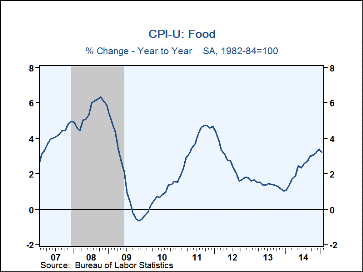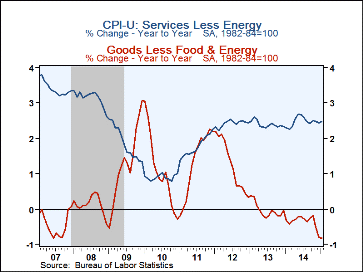 Global| Feb 26 2015
Global| Feb 26 2015U.S. Consumer Prices Decline as Energy Prices Plummet; Core Prices Improve
by:Tom Moeller
|in:Economy in Brief
Summary
The consumer price index fell 0.7% during January following a revised 0.3% decline during December, earlier reported as -0.4%. It was the largest monthly drop since December 2008 and the 12-month change of -0.1% was the greatest [...]
The consumer price index fell 0.7% during January following a revised 0.3% decline during December, earlier reported as -0.4%. It was the largest monthly drop since December 2008 and the 12-month change of -0.1% was the greatest decline since October 2009. January's decline compared to -0.6% expected in the Action Economics Forecast Survey. Energy prices pulled the CPI lower last month with a 9.7% decline (-19.6% y/y). Prices excluding food & energy improved 0.2% (1.6% y/y) following two months of 0.1% increase. Expectations had been for a 0.1% uptick.
The decline in energy prices reflected an 18.7% plunge in gasoline prices (-35.4% y/y). Prices have fallen 35.6% from their interim high last June. Fuel oil prices declined 9.9% (-29.7% y/y) and natural gas prices were off 3.4% (-0.4% y/y). Electricity costs rose 0.9% (2.5% y/y).
Food prices were relatively stable last month (3.2% y/y) following several months of moderate increase. Egg prices were off 1.8% (+8.2% y/y) while dairy prices declined 0.9% (+3.8% y/y). Fruit & vegetable costs also fell 0.9% (+2.3% y/y) while meat prices ticked 0.1% higher (12.5% y/y). Cereal & bakery product prices increased 0.7% (0.9% y/y) and nonalcoholic beverage prices improved 0.1% (0.9% y/y).
Prices for goods excluding food & energy slipped 0.1% (-0.8% y/y), the third straight month of decline. Furniture & bedding costs fell 0.5% (-2.2% y/y). Recreation goods prices also declined 0.5% (-2.8% y/y) and medical care goods prices were off 0.3% (+3.9% y/y). New vehicle prices slipped 0.1% (+0.5% y/y). To the upside, appliance prices ticked 0.1% higher (-4.9% y/y) and apparel prices gained 0.3% (-1.4% y/y).
Remaining firm were services prices which posted 0.3% rise (2.4% y/y) following four straight months of 0.2% increase. Tuition & other school fees jumped 0.5% (3.5% y/y) and recreation services prices also gained 0.5% (1.6% y/y). Transportation services fees gained 0.4% (2.1% y/y) while shelter prices rose 0.3% (2.9% y/y). Owners' equivalent rents of primary residence costs increased 0.2% (2.6% y/y). Medical care services prices gained 0.1% (2.3% y/y) but public transportation prices slipped 0.1% (-1.8% y/y).
The consumer price data is available in Haver's USECON database while detailed figures can be found in CPIDATA. The expectations figure is from Action Economics and is found in the AS1REPNA database.
| Consumer Price Index (%) | Jan | Dec | Nov | Jan Y/Y | 2014 | 2013 | 2012 |
|---|---|---|---|---|---|---|---|
| Total | -0.7 | -0.3 | -0.3 | -0.1 | 1.6 | 1.5 | 2.1 |
| Total less Food & Energy | 0.2 | 0.1 | 0.1 | 1.6 | 1.7 | 1.8 | 2.1 |
| Goods less Food & Energy | -0.1 | -0.2 | -0.3 | -0.8 | -0.3 | -0.0 | 1.3 |
| Services less Energy | 0.3 | 0.2 | 0.2 | 2.5 | 2.5 | 2.4 | 2.4 |
| Food | -0.0 | 0.2 | 0.2 | 3.2 | 2.4 | 1.4 | 2.6 |
| Energy | -9.7 | -4.7 | -4.1 | -19.6 | -0.3 | -0.7 | 0.9 |
Tom Moeller
AuthorMore in Author Profile »Prior to joining Haver Analytics in 2000, Mr. Moeller worked as the Economist at Chancellor Capital Management from 1985 to 1999. There, he developed comprehensive economic forecasts and interpreted economic data for equity and fixed income portfolio managers. Also at Chancellor, Mr. Moeller worked as an equity analyst and was responsible for researching and rating companies in the economically sensitive automobile and housing industries for investment in Chancellor’s equity portfolio. Prior to joining Chancellor, Mr. Moeller was an Economist at Citibank from 1979 to 1984. He also analyzed pricing behavior in the metals industry for the Council on Wage and Price Stability in Washington, D.C. In 1999, Mr. Moeller received the award for most accurate forecast from the Forecasters' Club of New York. From 1990 to 1992 he was President of the New York Association for Business Economists. Mr. Moeller earned an M.B.A. in Finance from Fordham University, where he graduated in 1987. He holds a Bachelor of Arts in Economics from George Washington University.
More Economy in Brief
 Global| Feb 05 2026
Global| Feb 05 2026Charts of the Week: Balanced Policy, Resilient Data and AI Narratives
by:Andrew Cates










